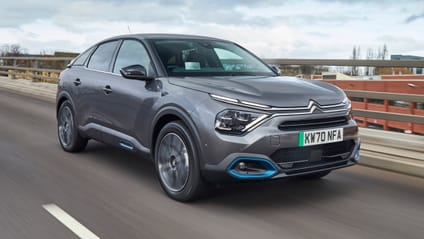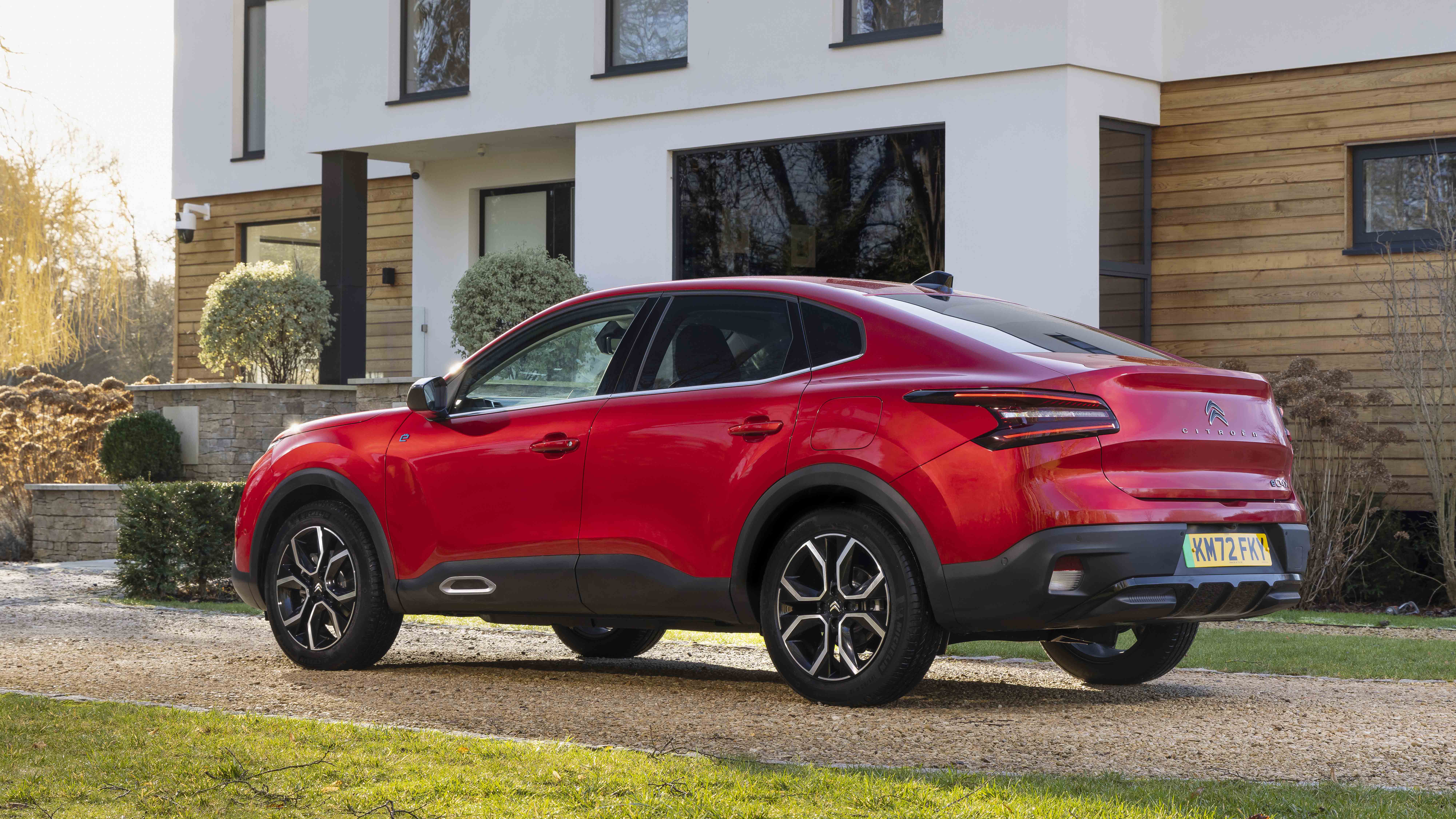
Good stuff
Easy as you like to drive, comfortable, reasonably practical
Bad stuff
Marmite looks, range a little unpredictable, price-to-range ratio not in its favour
Overview
What is it?
Just as Citroen disguises its MPVs as SUVs so they sell better (not unsuccessfully – see the C3 and C5 Aircross), it’s just begun to do the same with its hatchbacks. The e-C4 is ostensibly a five-door family hatch in the same mould as a Ford Focus or Volkswagen Golf, but it’s higher riding and has plenty of black plastic cladding around the bumpers and wheel arches to make it look all crossover-y.
Predictably the ‘e’ in e-C4 stands for electric. It sits on the same platform and uses the same drivetrain as the Peugeot e-208 and e-2008, Vauxhall Corsa Electric and Mokka Electric, and DS3 e-Tense.
There’s now also an e-C4 X, which Citroen is pitching as a ‘fastback’ – read saloon – meaning while the front and side profile are largely identical to the e-C4, it gets an elongated rear end (4.6m plays 4.36m). It’s otherwise like for like – powertrains, trims, even price – as you can see for yourself (the red one) in the gallery above. For the full lowdown there, click these blue words.
GOTCHA. SO HOW FAR CAN IT GO ON A CHARGE?
While launch models were solely available with a 50kWh battery mated to a 136bhp e-motor for up to 221 miles of range, a mid-2023 update adds a 54kWh battery and 154bhp e-motor pairing for up to 260 miles of range.
We’ve only tested the former to date, but drive smoothly and thoughtfully in Normal mode and you’ll get upwards of 4mi/kWh, which is very good. Nonetheless don’t expect to travel further than 200 miles in this version without switching the aircon off and driving everywhere at 10 per cent under the posted speed limit. We managed 170 miles or so between charges in mixed conditions. You’ll get less in winter, and more if you mostly drive in town. More on the Driving tab.
A 0 to 80 per cent charge takes half an hour (if you can find a 100kW rapid charger). A full charge takes around seven and a half hours on a domestic 7kW wallbox.
DOES CITROEN DO A NORMAL C4?
Yup. If you’re not quite ready to go electric, Citroen will do you a normal C4 (and e-C4 X) sans the e and with a conventional petrol or diesel combustion engine. Whichever powertrain you go for, the C4 looks and drives much the same.
WHAT ARE ITS COMPETITORS?
On the one hand you’ve got EV hatches like the Volkswagen ID.3 and Nissan Leaf, and on the other small crossovers like the related Peugeot e-2008/Vauxhall Mokka Electric and Hyundai Kona Electric/Kia Niro EV. In size terms, though the hatchbacks are obviously hatchbacks and the crossovers are obviously crossovers, get your tape measure out and you’ll find they’re all almost exactly the same size. And the e-C4 is right in the mix.
HOW MUCH DO I NEED TO SPEND?
You can get a normal Citroen C4 with a three-cylinder petrol engine for not much more than £21k. The cheapest e-C4, however, costs just £31,995, or £37,195 if you want the bigger battery/e-motor, which only comes in top spec trim. We do approve, however, that the e-C4 X is identically priced.
Our choice from the range

What's the verdict?
The e-C4 is easy to drive, comfortable and reasonably practical too. But don’t be fooled into thinking the fastback guise is in anyway sporty. It isn't. Though Citroen has at least introduced a bigger battery and more powerful electric motor combo to add a bit more zip.
That said, the price-to-range ratio isn’t necessarily on its side, especially when you consider how much value is packed into the MG 4 right now. You've got to really want that comfy ride to make this your pick of the litter.
The Rivals
Trending this week
- 2026 TopGear.com Awards
"Drives like a BMW ought to": why the iX3 is Top Gear's 2026 Car of the Year
- Car Review
Ferrari 849 Testarossa
- Car Review
Mercedes-Benz C-Class Estate










